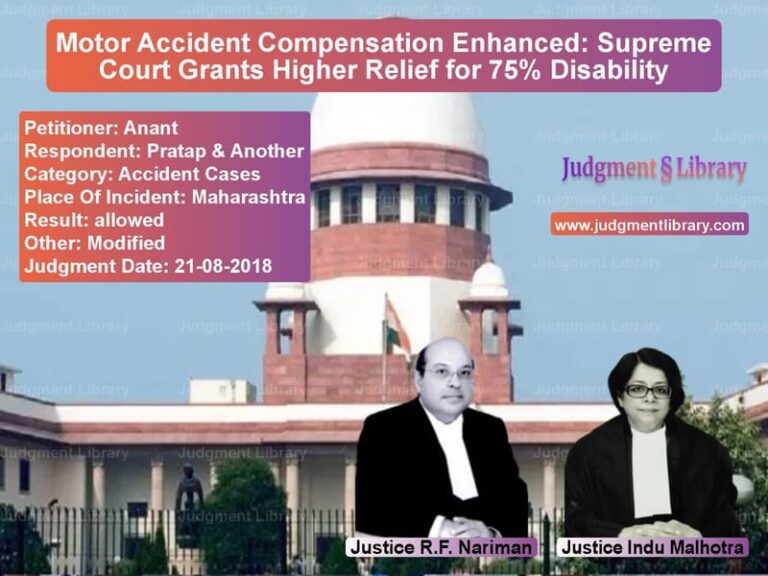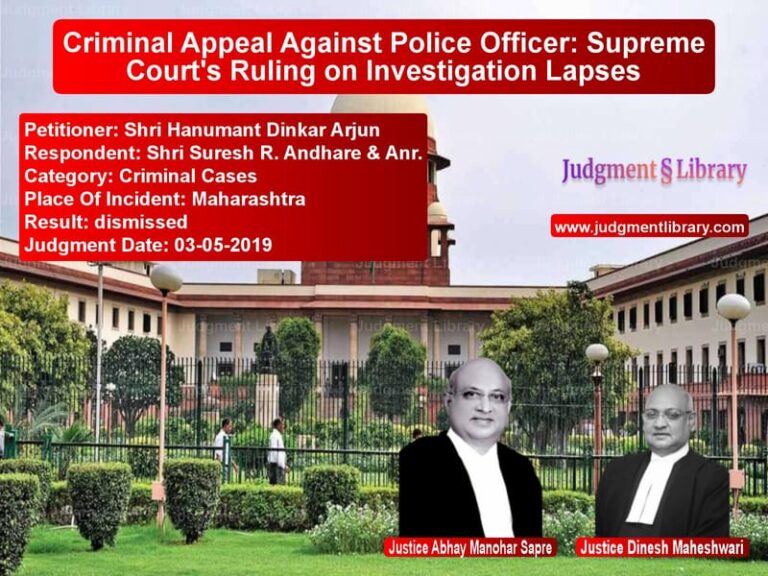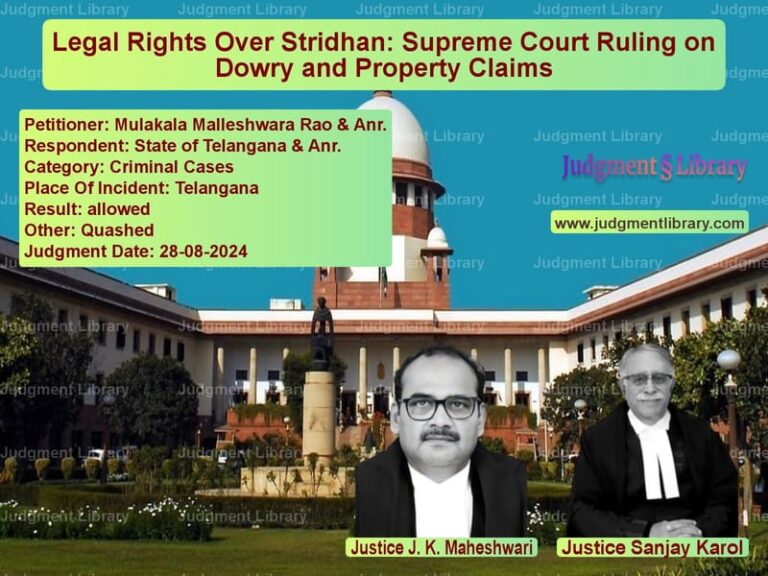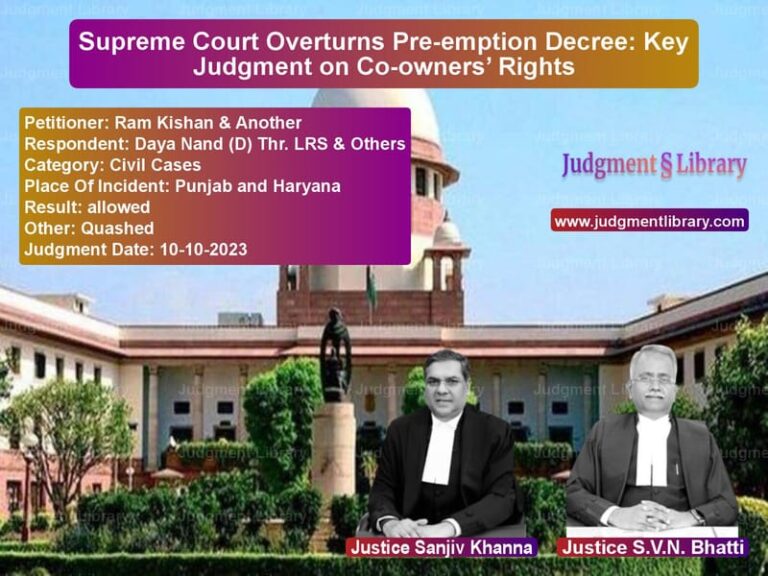Insolvency Proceedings Against Corporate Guarantors: A Case Analysis of K. Paramasivam v. Karur Vysya Bank Ltd.
This case revolves around the appeal filed by K. Paramasivam, the promoter and suspended director of Maharaja Theme Parks and Resorts Private Limited, against the order passed by the National Company Law Appellate Tribunal (NCLAT) and the Adjudicating Authority under the Insolvency and Bankruptcy Code (IBC). The appellant challenges the initiation of the Corporate Insolvency Resolution Process (CIRP) against his company, Maharaja Theme Parks and Resorts, which acted as a corporate guarantor for loans availed by three other entities. The Financial Creditor, Karur Vysya Bank Ltd., filed the petition under Section 7 of the IBC, seeking the initiation of CIRP due to the default of these borrowers.
Petitioner’s Argument
The appellant, K. Paramasivam, contends that the company, Maharaja Theme Parks and Resorts, is not a corporate debtor under Section 3(8) of the IBC, as it did not owe any financial debt to the Financial Creditor. The appellant argues that the company merely provided a guarantee for loans taken by three other entities, which are not corporate debtors. According to the appellant, since the principal borrowers were not corporate entities, Maharaja Theme Parks and Resorts could not be considered a corporate guarantor as defined under Section 5(5A) of the IBC. The appellant further argues that the company is not liable for the default of the principal borrowers and that the initiation of CIRP against the company is improper.
Additionally, the appellant submits that the NCLAT’s decision to dismiss the appeal and confirm the initiation of CIRP was erroneous. The appellant claims that the definition of a corporate guarantor in the IBC does not apply in this case, as the company did not guarantee loans taken by corporate entities. The appellant argues that the NCLAT failed to consider these points, and the order passed by the Adjudicating Authority should be set aside.
Respondent’s Argument
On the other hand, the Financial Creditor, Karur Vysya Bank Ltd., represented by Senior Counsel Mr. Nikhil Nayyar, argues that the appellant’s company, Maharaja Theme Parks and Resorts, falls within the definition of a corporate debtor under Section 3(8) of the IBC. The Financial Creditor contends that the company is liable for the default of the borrowers, as it provided a guarantee for the loans taken by them. According to the respondent, the Corporate Insolvency Resolution Process (CIRP) can be initiated against a corporate person who acts as a guarantor for the loans taken by other entities, regardless of whether those entities are corporate persons or not.
The Financial Creditor further refers to the case of Laxmi Pat Surana v. Union Bank of India, where the Court held that CIRP can be initiated against a corporate guarantor, even when the principal borrower is not a corporate entity. The respondent argues that the failure of the principal borrowers to repay their loans triggers the liability of the corporate guarantor, and the Financial Creditor is entitled to initiate insolvency proceedings against the guarantor. The Financial Creditor urges that the NCLAT’s decision was correct, and the appeal should be dismissed.
Court’s Analysis and Ruling
The Supreme Court, in its analysis, considered the arguments of both parties, the statutory provisions under the Insolvency and Bankruptcy Code, and the precedents set in previous judgments. The Court reviewed Section 7 of the IBC, which allows a Financial Creditor to initiate CIRP against a corporate debtor. The Court noted that the definition of a corporate debtor under Section 3(8) of the IBC includes a corporate person who owes a debt to any person, which may include a debt arising from a guarantee provided by the corporate person.
The Court also referred to the provisions under Section 5(5A) of the IBC, which defines a corporate guarantor as a corporate person who is the surety in a contract of guarantee to a corporate debtor. The Court examined the relationship between the principal borrower, the corporate debtor, and the corporate guarantor. It was observed that the liability of the guarantor is coextensive with that of the principal borrower, and the default by the principal borrower triggers the liability of the guarantor. The Court emphasized that the IBC does not differentiate between a corporate debtor and a corporate guarantor, and the term ‘corporate debtor’ is not limited to the principal borrower alone.
The Court also referenced the case of Laxmi Pat Surana, where it was held that CIRP can be initiated against a corporate person who is a guarantor, even if the principal borrower is not a corporate entity. The Court concluded that the definition of a corporate debtor under the IBC is broad enough to include a corporate guarantor, and the liability arising from the guarantee is sufficient to trigger CIRP against the guarantor.
The Court further noted that the appellant’s company, Maharaja Theme Parks and Resorts, had provided a guarantee for the loans of the borrowers, and the Financial Creditor had the right to initiate CIRP against the company due to the default by the borrowers. The Court rejected the appellant’s argument that the company did not fall within the definition of a corporate guarantor, as the company had provided guarantees for the loans of the borrowers. The Court found no merit in the appellant’s contention and upheld the decisions of the Adjudicating Authority and the NCLAT.
Conclusion
The Supreme Court dismissed the appeal and upheld the order of the NCLAT, allowing the initiation of Corporate Insolvency Resolution Process (CIRP) against Maharaja Theme Parks and Resorts. The Court affirmed that a corporate guarantor, even if not a corporate debtor itself, is liable for the debts of the principal borrower, and the Financial Creditor has the right to initiate CIRP against the guarantor. This case reinforces the broad scope of the Insolvency and Bankruptcy Code and the legal obligation of corporate guarantors to fulfill their responsibilities in case of default by the principal borrower. The decision highlights the importance of corporate guarantees in securing loans and the legal consequences for corporate guarantors who fail to meet their obligations.
Petitioner Name: K. Paramasivam.Respondent Name: The Karur Vysya Bank Ltd. & Anr..Judgment By: Justice Indira Banerjee, Justice J.K. Maheshwari.Place Of Incident: Maharaja Theme Parks and Resorts, Faridabad.Judgment Date: 06-09-2022.
Don’t miss out on the full details! Download the complete judgment in PDF format below and gain valuable insights instantly!
Download Judgment: k.-paramasivam-vs-the-karur-vysya-bank-supreme-court-of-india-judgment-dated-06-09-2022.pdf
Directly Download Judgment: Directly download this Judgment
See all petitions in Company Law
See all petitions in Corporate Governance
See all petitions in Bankruptcy and Insolvency
See all petitions in Judgment by Indira Banerjee
See all petitions in Judgment by J.K. Maheshwari
See all petitions in dismissed
See all petitions in supreme court of India judgments September 2022
See all petitions in 2022 judgments
See all posts in Corporate and Commercial Cases Category
See all allowed petitions in Corporate and Commercial Cases Category
See all Dismissed petitions in Corporate and Commercial Cases Category
See all partially allowed petitions in Corporate and Commercial Cases Category







